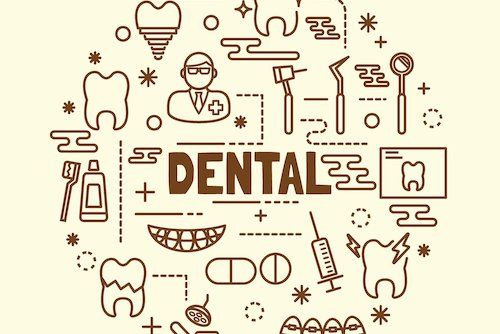THE IMPORTANCE OF MAINTAINING GOOD ORAL HEALTH IN RETIREMENT
WebAct Web Design • January 27, 2017


You’re probably not thinking about your dentist on Valentine’s Day, but with all the candy, kissing, and primping that takes place on this holiday, you probably should. True, it’s not very romantic to think about your hygienist when you’re on a date, and children really don’t want to hear about cavities when they open up a carton of candy Red Hots, but there’s sense in thinking about your mouth and practicing some care. Tooth fillings and gum disease are the least romantic things that can result from a little Valentine’s Day indulgence. Here are some things to consider. Go Easy on the Sweets Message hearts, candy roses, boxes of chocolates – Valentine’s Day is full of sweet goodies. The trouble is these treats are full of sugar. When we eat sugar, it reacts with the living bacteria in our mouths to create acid, which in turn decays teeth, causing a cavity. While not eating sugar is the surest way to avoid a cavity, on a day like this, that’s probably not possible, especially for children. Practicing some restraint and hygiene can help prevent cavity formation. Indulge in sugar free candy, or candy that melts quickly in the mouth. The less time the sugar is inside our mouths, the less time it’s interacting with bacteria. Try to limit the treats to one time, rather than extending over a period of days. This way, there’s only one incident, which lowers cavity risk. After eating sugar, do a mouth rinse with water or mouthwash (if your child is old enough), or better yet, brush and floss. Immediately flushing sugar out of the mouth prevents it from sitting around with the bacteria for a long time. Kissing This is a popular Valentine’s Day activity, and thankfully, your dentist would approve. Kissing increases saliva production, which in turn fights cavities. Add this to your post-candy routine! The down side is if your valentine has poor dental hygiene. The germs and disease in their mouth will get transferred to yours. Yuck. Both of you would do well to swish some mouthwash before a night out. It kills bacteria and freshens breath, so that way you don’t give your date an unpleasant gift of oral disease. A Clean Mouth is a Sexy Mouth No one wants to kiss someone with bad breath, so chew some sugarless gum. It increases saliva and freshens breath. Regular brushing and flossing regulate bad breath and keep bacteria at bay, so make sure you keep up this routine. That said, make sure you don’t share a toothbrush with your partner as this is a prime way to transfer germs. Want to dazzle for your date? Consider some whitening strips to make your smile glow. Dentists can professionally whiten your teeth as well, a great option for a long term solution. The worst thing you can do for your mouth? Smoke. It shouldn’t come as much surprise that smoking makes your breath smell bad, your teeth stain yellow, and it makes you twice as likely to develop gum disease and oral cancer. Not exactly a recipe to win over your date. Both children and adults should visit their dentist twice a year to keep mouths clean, healthy, and looking great.

There are no do-overs when it comes to first impressions, and smiles are the first thing people notice about you. If you’re not 100% happy with your smile, here are five proven ways to get the smile you’ve always wanted. Orthodontics Orthodontic treatment no longer means clunky silver braces. There now are a number of options in orthodontia that are far less noticeable. Though traditional metal braces are still popular for children and teens and are extremely effective, there now is an almost-invisible option to straighten teeth. Invisalign treatment features a number of custom clear trays that move teeth into alignment, just like traditional metal braces. The benefit, though, is that most people won’t even know you’re undergoing treatment. If this sounds like an option you’re interested in, your dentist can tell you whether you’re a candidate. Teeth-Whitening Make your smile sparkle in no time with one of the most basic in-office dental treatments. With the help of a whitening gel and special lights, you can remove months or even years of stains from your teeth. You can even manage some of the treatments from the comfort of your own home. Veneers Veneers are a painless, quick way to improve your smile. They are custom crafted by your dentist and affixed to the enamel of your teeth to give them a new, uniform look. Veneers are a great option if you’re unhappy with discoloration or size variation in your teeth. In addition to permanent bonded veneers, snap-in veneers are an option for those who do not want to permanently alter your teeth. Bonding Don’t let missing or chipped teeth affect your confidence. Dental implants are a popular solution to fix these common problems. Breaks and cracks in teeth can be filled with materials that match the exact color and texture of your teeth, leaving imperfections completely unnoticeable. Dental Implants Losing adult teeth is unfortunately permanent, but living with gaps from missing teeth doesn’t have to be. Dental implants are a great option for people who have lost an entire tooth. Metal posts are surgically implanted into the gums to act just like your tooth’s natural root. A crown (the visible part of your tooth) is constructed to match the color, size, and shape of your other teeth and is attached to the metal root. Implants are nearly indistinguishable from your other teeth and provide a more natural solution than removable dentures to replace lost teeth. With so many options, there’s no reason to be unhappy with your smile. Consult your dentist about what options are best for you. Get ready to rock that first impression.

At Wash Park Dental we are frequently asked questions about chipping a tooth. “Is it big a deal? Doesn’t it depend on how big the chip is? While for most people a chip may seem mostly a cosmetic concern, it is important to know that any time that you chip or otherwise damage a tooth it is important to have your tooth and gums evaluated by a dentist to rule out any underlying damage and to protect your tooth from additional harm. For example, if dental pulp at the center of the tooth has been exposed, your tooth could become hypersensitive to temperature and pressure, causing recurring discomfort. The pulp could also become infected, resulting in a need for root canal treatment. In most cases, you should plan to have your chipped tooth repaired. The treatment how deep the chip runs. A chipped tooth equals a significant loss of tooth structure and can even contribute to new chips in the future and cracks in the enamel over time. Very small chips at the edges of teeth may be fixed simply by polishing them with dental instruments to remove rough edges. Over time, however, the bonding material can chip or stain, and therefore may eventually need to be replaced. A dental veneer can be used to hide smaller areas of missing tooth. This is a thin, custom-made shell placed on the front of the tooth to give it a new façade. Some removal of existing tooth surface may be necessary to fit a veneer so it is flush with the surfaces of surrounding intact teeth. Dental cosmetic bonding is the quickest and lowest-cost option to repair a chip. Bonding involves an application of a composite filling material that your dentist will color and shape to match the original tooth. Little to no removal of existing tooth surface is needed.If a substantial part of the tooth has chipped off, it should be recovered and saved if possible. In some cases, your dentist may be able to reattach it via bonding. Otherwise, depending on the extent of tooth loss, the bonding material can be used to replace the lost portion. In rare cases, a dental extraction and tooth replacement may be necessary to repair your tooth. For minor chips, dental bonding or a veneer may be available to cosmetically repair your tooth. It is also important to learn how to avoid chipping a tooth. Of course, accidents happen, but there are steps you can take to substantially reduce the risk of ever experiencing a chipped tooth — for example, wear a dental bite guard while playing sports, don’t grind or clench your teeth, don’t crunch on ice chips or hard candies, and don’t use your teeth as a tool for opening things! The most important thing to remember is that if you chip a tooth, you need to see a dental professional for a proper evaluation and treatment remedy. Contact us to learn more today!
